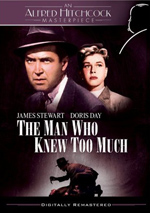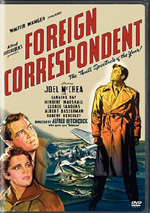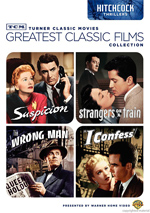|
UNIVERSAL
|

| |
|
MOVIE INFO
|
|
Director:
Alfred Hitchcock
Cast:
James Stewart, Doris Day, Brenda De Banzie, Bernard Miles, Ralph Truman, Daniel Gélin, Mogens Wieth
Writing Credits:
John Michael Hayes, Charles Bennett (story), D.B. Wyndham-Lewis (story)
Tagline:
A little knowledge can be a deadly thing!
Synopsis:
Dr. Ben McKenna his wife Jo and their son Hank are on a touring holiday of Africa when they meet the mysterious Louis Bernard on a bus. The next day Bernard is murdered in the local marketplace but before he dies he manages to reveal details of an assassination about to take place in London. Fearing that their plot will be revealed the assassins kidnap Hank in order to keep the McKenna's silent. Ben and Jo go to London and take matters into their own hands.
Box Office:
Budget
$2.5 million.
Domestic Gross
$10.250 million.
MPAA:
Rated PG
| |
|
DVD DETAILS
|
Presentation:
Aspect Ratio: 1.85:1/16X9
Audio:
English Monaural
French Monaural
Subtitles:
English
Spanish
Closed-captioned
Supplements Subtitles:
English
Spanish
French
Runtime: 120 min.
Price: $19.98
Release Date: 2/7/06
Bonus:
• “The Making of The Man Who Knew Too Much” Documentary
• Production Photographs
• Production Notes
• Trailers
| |
|
PURCHASE @ AMAZON.COM
|

| |
|
EQUIPMENT
|
Panasonic 50" TH-50PZ77U 1080p Plasma Monitor; Sony STR-DG1200 7.1 Channel Receiver; Panasonic DMP-BD60K Blu-Ray Player using HDMI outputs; Michael Green Revolution Cinema 6i Speakers (all five); Kenwood 1050SW 150-watt Subwoofer.
| |
|
RELATED REVIEWS
|


| |
|
The Man Who Knew Too Much (1956)
|
|
Reviewed by Colin Jacobson (May 28, 2010)
Not too many directors remake their own flicks, but Alfred Hitchcock took that step via 1956’s The Man Who Knew Too Much. A reworking of his 1934 movie of the same title, Man introduces us to the McKenna family: Ben (James Stewart), wife Jo (Doris Day) and son Hank (Christopher Olsen). During a trip to Europe, they decide to stop in Morocco for a few days.
On a bus ride, Hank accidentally removes a veil from a Muslim woman. Her husband goes ballistic but a helpful Frenchman named Louis Bernard (Daniel Gelin) intervenes and halts the trouble. Grateful, Ben chats with Louis and invites him to dinner. He suspects no trouble, but Jo grows suspicious of Bernard, especially when she sees him chat with the angry husband in what appears to be a friendly manner.
Jo’s suspicions prove correct. A weird police chase ends in the stabbing of Bernard – oddly, while the Frenchman is made up as a native. Before he expires, Bernard whispers a secret to Ben that an unnamed statesman will soon be assassinated in London.
When questioned by police, Ben learns that Bernard was an intelligence agent. He also receives an ominous call that warns him not to spill the beans or something bad will happen to Hank, who we soon find out has been kidnapped. The film follows Ben’s attempts to rescue his son and deal with this disturbing situation.
When I watched all the James Bond movies, I noted that even a lackluster 007 effort still has reasonable entertainment value. I feel the same about Hitchcock’s work, as even his weaker efforts manage to provide something to occupy us.
I mention this concept because I find Man to be decidedly ordinary Hitchcock. It follows themes found in many a Hitchcock release. Hitch loved the idea of the ordinary man in extraordinary circumstances, and Man exemplifies that. Actually, it broadens a bit to include the ordinary man and woman, as both Ben and Jo essentially act as equals here. That’s an unusual touch, and one that adds a little life to the film.
But not enough. I can’t quite put my finger on it, but something about Man just leaves me cold. Something about it seems off, as it never prompts the usual levels of intrigue and tension.
Indeed, Man strikes me as rather dull much of the time, again for reasons I can’t quite explain. The plot boasts the requisite twists and intrigue, but it just never really comes together. The movie strikes me as one with all the right parts; they simply fail to connect in a satisfying manner.
I can’t help but feel that Doris Day is miscast here. She may be a blonde, but otherwise she never strikes me as a real “Hitchcock woman”. Granted, since Jo’s a mother, Man offers an unusual part for its leading lady when compared to the director’s other works. Nonetheless, I think someone less wholesome would make more sense. On the surface, Day makes sense as the wife of a Midwest doctor, but she never fits in the Hitchcock world.
Of course, Stewart feels right at home in these surroundings, but even he doesn’t bring much to the material. It seems like he’s on cruise control throughout the movie, as it rarely appears to really occupy him. Perhaps the tale’s split focus on Ben and Jo creates some problems, since it lacks one true central figure. There’s no reason Man can’t pull off that bifurcation, but it doesn’t. The dual focus is awkward and not integrated in a strong manner.
Man does manage to entertain at times, and a few sequences work quite well. I rather like the bit at the taxidermy shop, and the climax in the Albert Hall reminds us of why Hitchcock was such a special director. In the end, though, the whole feels like less than the sum of its parts. This is an ordinary Hitchcock offering that just doesn’t do much for me.
|
The DVD Grades: Picture D+/ Audio C-/ Bonus C+
|
|
The Man Who Knew Too Much appears in an aspect ratio of approximately 1.85:1 on this single-sided, double-layered DVD; the image has been enhanced for 16X9 televisions. The transfer was a bit of a mess.
Sharpness was a significant concern. The image exhibited an odd instability that made definition erratic and iffy. Parts of the flick looked reasonably concise, but plenty of shots were rather soft. Moiré effects and jagged edges presented no concerns, but I noticed prominent edge enhancement.
At least source flaws were less dominant than usual, as only sporadic instances of specks and marks appeared. This wasn’t a tremendously clean presentation, but it didn’t show terrible signs of age.
Colors looked fairly muddy. Some hues appeared a bit pale but for the most part, they tended to be excessively heavy. The movie featured a brownish tone that didn’t come across especially well. Black levels generally looked deep and dark, and contrast seemed decent. Shadow detail also was fairly clear, though some scenes came across as too heavy. I’d estimate about half of the low-light sequences should slightly excessive opacity, while the others seemed appropriately visible. This was a consistently drab image.
The monaural soundtrack of Man seemed fairly ordinary. Dialogue was a bit brittle and harsh, but the lines remained intelligible and showed no serious concerns. Effects also were thin, but these seemed typical of the period and presented no significant problems.
Music emphasized the highs, which were decent but without great clarity. Not much range came from the score, and I noticed some background hiss through much of the film. Ultimately, the soundtrack seemed acceptable given its age, but it didn’t sound any better than that.
Fans of the other Hitchcock DVDs will find familiar supplements here. We start with The Making of The Man Who Knew Too Much, a 34-minute and 16-second documentary. As usual, it combines movie snippets, archival elements, and interviews. We get notes from director’s daughter Pat Hitchcock O’Connell, associate producer Herbert Coleman, screenwriter John Michael Hayes, production designer Henry Bumstead, and Bernard Herrmann biographer Steven C. Smith.
“Making” looks at the original 1934 version of the film and its adaptation in the 1950s. It also examines locations and related challenges, cast and performances, set design, music, thoughts about the flick, and a few scene specifics. I’ve enjoyed all the other Hitchcock documentaries, and this one is another good one. I might’ve liked to see more comparisons between the two versions of the movie, but I still think the show works well.
Two theatrical trailers show up here; one is for the original 1956 release, while the other comes from a re-release in the 1980s, I believe. The 1956 one is fun to see due to some unique footage – including a scene from the movie that introduces Doris Day by her name, not in character – but it ends rather abruptly, so I expect it’s missing some footage. The re-release ad actually covers five Hitchcock flicks, so it’s not unique to Man. Then-new narration from James Stewart makes this one moderately interesting.
Some stillframe materials finish the set. Production Photographs presents a running reel with behind the scenes images, publicity shots and some advertisements. It runs four minutes, 14 seconds and includes some good stuff; I especially like the fact it boasts a few posters from the 1934 Man. Text Production Notes tell us a little about the flick. They’re basic but worth a look.
I like Alfred Hitchcock’s work enough to find some merit in The Man Who Knew Too Much, but I nonetheless don’t regard it as a particularly interesting offering. It moves slowly and rarely becomes as involving and intriguing as expected. The DVD suffers from poor picture and mediocre audio as well as a modest complement of supplements. Man is worth a look for Hitchcock devotees, but it doesn’t do much for me.
|
|
Viewer Film Ratings: 3.5 Stars | Number of Votes: 2 |
|
|

